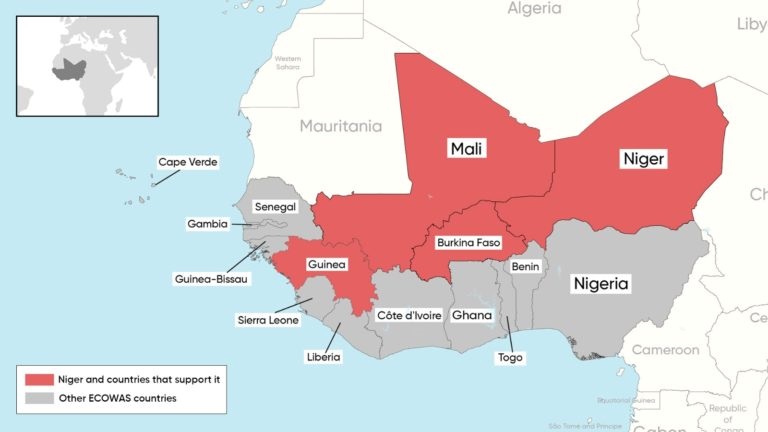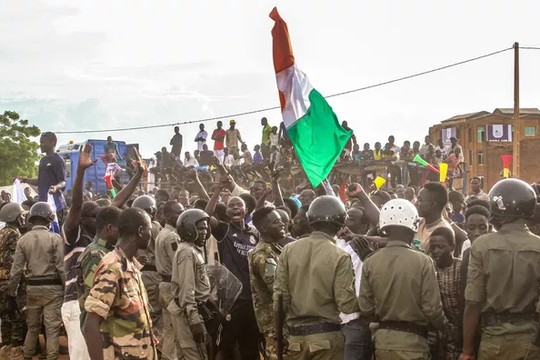Supporters of the Nigerien junta take part in a demonstration on Friday in front of a French army base in Niamey.
Photo: Figaro – Reuters
“With such allies, we do not need enemies,” (“Avec des alliés comme ça, on n’a pas besoin d’ennemis,”) said in Paris, according to the newspaper ‘Figaro’, citing a source within the French Foreign Ministry.
The United States has been very active in the crisis in Niger. It was even too active when, on August 7, American diplomacy in the person of Victoria Nuland sat down at the negotiating table with the putschists. “They did exactly the opposite of what we thought,” they said in Paris.
Paris has been insisting on the reinstatement of ousted President Mohamed Bazoum ever since a new military government came to power in Niger in a coup in late July. From the very beginning of the events in Niger, France has not hesitated to stick to a clear line: the restoration of Mohamed Bazum to the presidency.
“For Emmanuel Macron, the credibility of France in Africa was at stake, especially in terms of maintaining democracy. For the Americans, even if they are too concerned about a speedy return to constitutional order, stability in the region is a priority,” the French diplomat said. “Washington has chosen its own interests over its allies,” has told the newspaper, following Victoria Nuland’s visit post-coup Niger. ‘Le Figaro’ reported, citing a source within the French Foreign Ministry, “With allies like these, we do not need enemies.”
Americans simply want “to keep their bases” in the region above all else, the diplomat said, adding that Washington “will not hesitate” to drop a demand for what he called “constitutional legality” to achieve this goal.
Now, Paris fears that Washington could reach an agreement with Niger’s military government behind France’s back.
According to ‘Le Figaro’, Paris is also displeased by the fact that, despite both France and the US having troops in Niger, it is only the French presence that provokes resentment among the locals. “The United States, like our other allies for that matter, has a habit of letting us take the hits,” the French diplomat told the paper.
The US has a sizable force on the ground in Niger, amounting to some 1,300 soldiers and almost equaling that of France, which has around 1,500 servicemen in the country. American troops are divided between two bases, located in the Niger capital of Niamey and the northern city of Agadez.
Agadez is reportedly of particular importance for Washington as it houses a landing strip for drones and serves as a surveillance hub for a large area stretching from West Africa to Libya in the north (photo):

The French government was also ready to support the use of force by West African nations for that purpose, as it upheld the Economic Community of West African States (ECOWAS) in its decision to mobilize reserve forces in the wake of the ousting.
The African Union (AU) said on Wednesday, August 16, that it will not support the military intervention that the Economic Community of West African States (ECOWAS) is planning, with the backing of France and the US, to restore ousted Mohamed Bazoum to Niger’s presidency.
Ten days after the expiry of the deadline given by ECOWAS to Niger’s military government to restore Bazoum, the sub-regional bloc is beset by internal disagreements and domestic opposition in its member states.
Nigeria’s senate earlier this month refused to support President Bola Tinubu’s plan to deploy troops. Nigeria is Africa’s most populous country and its largest economy, amounting to about 67% of ECOWAS’ GDP. It also has the largest military in the bloc.

Waving flags of Nigeria and Niger together, anti-war protesters, who took to the streets in Nigeria’s Kano State on the border with Niger, sloganeered: “Nigeriens are our brothers; Nigeriens are also our family.” They denounced the plans for aggression against their northern neighbor as “a plot by Western forces.”
In the north of Nigeria, the Hausa tribe (also Hausans, hausawa) lives – the largest ethnic group in Nigeria, about 60 million, 25% of the country's population. They also live in Niger (13-14 million, half of the country's population). This is essentially one people, one language, one tribe:

Senegal and Benin have committed an unspecified number of troops for the ECOWAS invasion. Joining the fray is also Sierra Leone.
Ivory Coast has committed 850 to 1,100 troops. “This coup d’etat is not acceptable,” maintains its president Alassane Ouattara, who came to power in 2011 with the help of a military offensive backed by US and France against the incumbent to whom Ouattara had officially lost a disputed election.
Liberia, along with Gambia — where the ECOWAS had previously intervened in 2017 — have been sitting on the fence, undecided as yet on whether or not to send troops.
Further stultifying the bloc is the fact that strong disagreements are also surfacing between its main backers — Niger’s former colonizer France, which has up to 1,500 troops in the country, and the US, with another 1,100 troops in two bases.
Keener on military action, France is reportedly opposed to the US line of seeking further negotiations, and is unwilling to accept anything less than the reinstatement of its close ally Bazoum.
Mali and Burkina Faso, whose popular military governments have successfully ordered the French troops out, have declared that their military forces will come to the defense of Niger, treating any attack on it as an attack also on them.
read more in our Telegram-channel https://t.me/The_International_Affairs

 10:37 20.08.2023 •
10:37 20.08.2023 •























